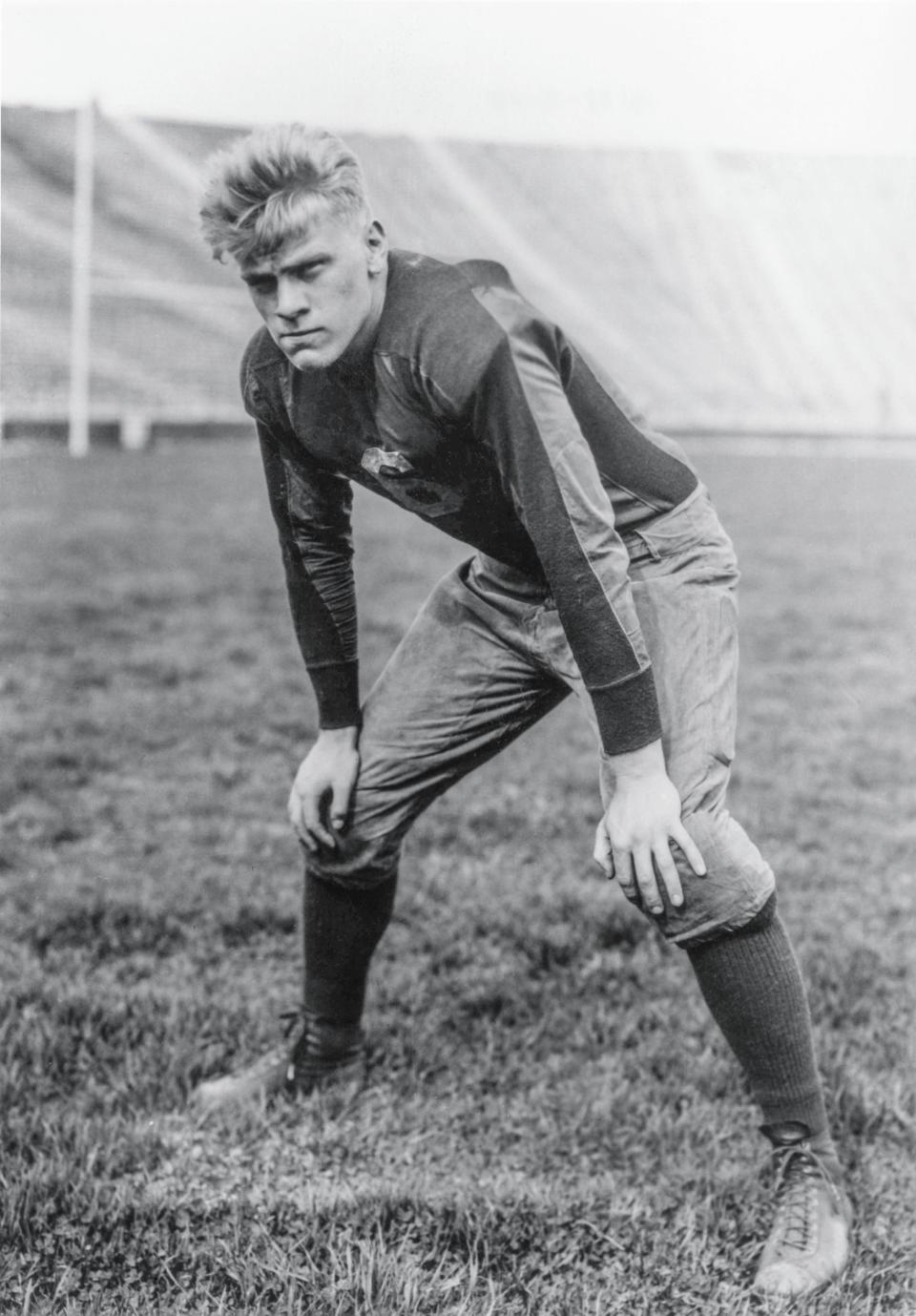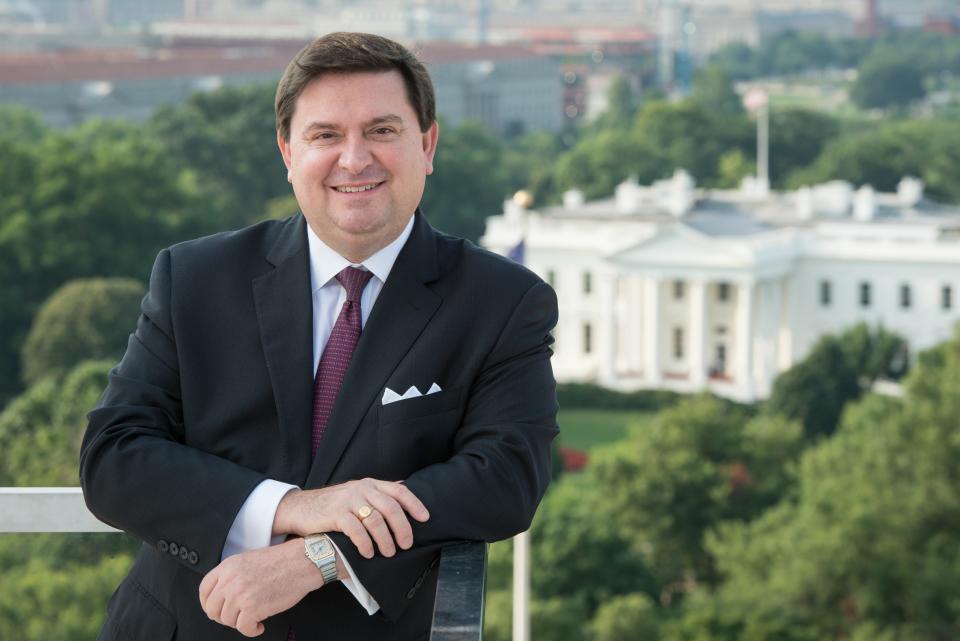President Ford turned down NFL contracts for the White House. Our presidents loved football.
- Oops!Something went wrong.Please try again later.
- Oops!Something went wrong.Please try again later.
- Oops!Something went wrong.Please try again later.
- Oops!Something went wrong.Please try again later.
With fall comes a new season of football, a game that has shaped many of our 20th century presidents – even as it grew into a national passion, rich with rituals: marching bands, rivalries like Army vs. Navy, and championship games that lead to White House visits.
Theodore Roosevelt loved the ruggedness of the sport and was the first of more than a dozen presidents to attend the annual Army-Navy game in 1901. But in an era before mandatory helmets and facemasks, concern was growing about the number of players dying from brutal injuries.
Roosevelt, whose son played for Harvard, issued an ultimatum: If safety measures weren’t implemented, he would find a way to outlaw the sport. Changes followed.
Which American presidents played football?
The first president to play the game was Dwight Eisenhower, who started at running back and linebacker for Army (where he played against the legendary Jim Thorpe). But a career-ending knee injury left him so depressed that he considered leaving West Point. (“Life seemed to have little meaning,” he later recalled. “A need to excel was almost gone.”) But he stayed on, and coached the junior varsity team.
Where past and present coexist: White House furniture is America's living history
John F. Kennedy, whose family reveled in playing touch football on their front lawn, was a junior varsity wide receiver whose career at Harvard was also hobbled by injuries. He attended every Army-Navy game while president, and tossed the pregame coin at the 1963 Orange Bowl.
“We do not want our children to become a generation of spectators,” Kennedy said. “Rather, we want each of them to be a participant in the vigorous life.”
Richard Nixon played offensive tackle at Whittier, a Quaker college whose team was named the Poets. Though he was undersized and got little playing time – one teammate called him “cannon fodder” – he credited the game and his coach with building his tenacity.
Nixon remained a football superfan his whole life, and as president he attended scrimmages with Washington coach George Allen (who had once coached Whittier). He’s rumored to have suggested that Allen call a rare flanker reverse in 1971.
Nixon’s successor Gerald Ford was our most football-oriented president. Ford was a star center at the University of Michigan, where he was named most valuable player.
When the university agreed to bench Ford’s Black teammate (and roommate) Willis Ward in a 1934 game at segregated Georgia Tech, Ford had to be talked out of quitting the team. After enduring a stream of racist taunts from one of the opponent’s linebackers, the future 38th president of the United States helped deliver a hit so hard that the linebacker left the game on a stretcher. “That one was for you,” he told Ward.
Presidential history: From Lincoln's cottage to Washington's farm, preserving history helps us prepare leaders
Presidents know that football is more than a game
After Ford’s death in 2006, Michigan lawmakers were hesitant to replace one of their state’s two commemorative statues in the U.S. Capitol with a likeness of the former president. It was the state senate’s Democratic floor leader Buzz Thomas who carried the day, telling the story of Gerald Ford and Willis Ward – a story he knew well, since Willis Ward was his grandfather.
After college, Ford turned down contracts from the Detroit Lions and Green Bay Packers for Yale law school, where he helped coach the football team for $50 a week to pay his tuition.
“There are plenty of parallels between football and elective politics,” he said in 1972 after rising to become minority leader in the U.S. House of Representatives. “You play hard, you play to win, but you don’t last long if you don’t play clean. Fumbles and lucky breaks you take in stride, and you soon learn you can’t win ’em all.”

President Jimmy Carter began the ritual of inviting football champions to the White House, when the Pittsburgh Steelers came in 1980.
His successor, Ronald Reagan – a lineman at Eureka College in Illinois, who played Notre Dame player George Gipp in the movie "Knute Rockne, All American" – opened up Super Bowl XIX by video in 1985 with a coin toss at the White House.
So many of our presidents have recognized that football is more than a game. They’ve heard its call to vigor, and the lessons it offers to all of us as we confront challenges, whether or not we ever played.
In November 1963, Kennedy was looking forward to returning to Philadelphia’s Municipal Stadium to watch his beloved Midshipmen play Army again. After the president was assassinated, the military academies prepared to cancel the game – until the Kennedy family asked that it be played, a ritual of recovery for a nation reeling and mourning.
Navy won that day, in front of 102,000 fans. A year later, the tradition continued – at the newly renamed John F. Kennedy Stadium.

Stewart D. McLaurin is a member of the USA TODAY Board of Contributors and president of the White House Historical Association, a private nonprofit, nonpartisan organization founded by first lady Jacqueline Kennedy in 1961 to privately fund maintaining the museum standard of the White House and to provide publications and programs on White House history.
You can read diverse opinions from our Board of Contributors and other writers on the Opinion front page, on Twitter @usatodayopinion and in our daily Opinion newsletter. To respond to a column, submit a comment to letters@usatoday.com.
This article originally appeared on USA TODAY: Football was more than a game for these US presidents

